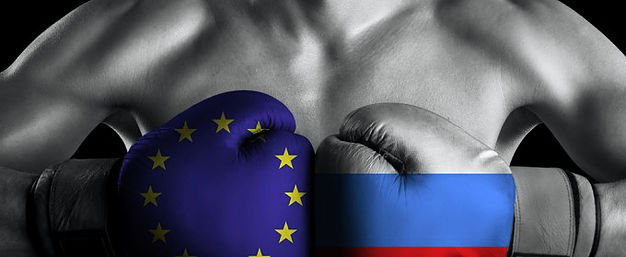In 1999 Javier Solana spoke longingly about the mutual economic and political benefits of the EU-Russian ‘strategic partnership.’ Solana’s aspirations seemed to be fulfilled when the EU and Russia launched their first institutionalised framework for cooperation in energy policy – the EU-Russian Energy Dialogue in 2000 and sought to develop mechanisms for the combat of international terrorism after September 11 2001.
Four years later, the first political crisis between the EU and Russia was triggered by a confrontation over Ukraine. After the EU’s diplomatic mission to Kiev in 2004 resulted in repeated presidential elections leading to the victory of the pro-Western candidate, the Kremlin was outraged about the EU’s interference in what it considered to be Ukraine’s domestic affairs. President Putin’s heavy investment in having supported the pro-Russian candidate in an attempt to keep Ukraine under Russia’s orbit resulted in ‘much ado about nothing.’ The EU’s acquired ability to strategically resolve a political conflict in a country of the former-Soviet space resulted in the Russian policy maker’s hostile perceptions of the EU’s deliberate attempt to seek to increase its influence over the post-Soviet space, to the detriment of the Kremlin’s interests.
Ukraine crisis
About a decade later, the rivalry over the former Soviet space, which emerged after the ‘Orange Revolution’ in Kiev in 2004, has culminated in the current Ukraine crisis. The EU-Russian competing integrative approaches over the post-Soviet states have played a crucial role in the emergence of the renewed EU-Russian confrontation over Ukraine. The Kremlin’s pressure on Ukraine, intending to prevent its institutionalization of its Eastern Partnership with the EU and the developing crisis in Ukraine, were just the starting points of increasing strains in EU-Russian relations. Russia’s annexation of Crimea, the EU’s resulting imposition of sanctions and Russia’s response with counter sanctions have resulted in a political crisis in EU-Russia relations whose intensity would have been unthinkable during the Kosovo war in 1999.
Whilst Russia was facing the most severe crisis in its relations with the US and NATO since the end of the Cold War, Russian policymakers perceived the EU as a malign actor and the acceptable face of the West during the Kosovo crisis. At the same time EU-Russian diplomatic cordiality was fostered by the German European Council Presidency, which was extraordinarily supportive regarding Russia’s concerns after its economic collapse in 1998. President Yeltsin reciprocated this cordiality and regretted that Russia was not an EU member state. Being faced with this major international conflict in Kosovo and domestic political pressures in Brussels and Moscow, the EU and Russia became diplomatic partners who negotiated the peace plan for this crisis.
Relationship breakdown
This gradual transformation from cordiality to confrontation in EU-Russia relations leads to the following question: Why did the relationship deteriorate between 1999 and 2015? An examination of the reasons for the relationship’s reversal is at the core of my book.
I analyse changes in the EU-Russian relationship’s evolution, as well as internal political dynamics in both the EU and Russia. During the time period I’ve investigated, the EU and Russia have emerged as political entities. I argue that the EU’s and Russia’s divergent internal developments were major determinants in the relationship’s reversal.
Since 1999, the EU has intended to increase its weight in foreign policy. The creation of the Office of the High Representative for the Common Foreign and Security Policy and a series of treaty changes exemplified its ambition to become a global actor. However, as my book demonstrates, the EU’s relations with Russia presented a series of challenges, which shed light on the EU’s difficulty to fulfil its expectations regarding its enhanced impact in foreign policy. The EU’s internal division regarding its adoption of a unitary stance in its relations with Russia often revealed the EU’s limits as a foreign policy actor, who managed to maintain a firm policy line towards Russia.
Putin era
No less significant for the deterioration of EU-Russia relations between 1999 and 2015 was Russia’s political development. During the Putin era, there were increasing signs of the curtailing of democracy. The latter was exemplified by the introduction of reforms which increased power in the hands of the Kremlin, enhanced state control over the Russian energy market, the politicization of energy supply, as well as the violent dispersal of peaceful oppositions to the Putin regime.
The EU’s increasing influence in the post-Soviet space, the EU-Russian rivalry over the post-Soviet space, the EU’s and Russia’s competing regional integration efforts with this region and Russia’s portrayal of signs of semi-authoritarianism are some major factors which contributed to the worsening of the relationship.
The evolution of EU-Russian diplomatic relations in the short to medium-term will depend on several aspects. First, it is likely to be shaped by the development of the Ukraine crisis. Currently both the EU and Russia accuse each other of being responsible for the crisis in Ukraine. Only time will tell if one of the partners is making the first step in seeking to resolve the deadlock over Ukraine. Second, the partner’s discrepancy over the role of values in their relationship will challenge their abilities in developing the setting for a mutually agreed foundation for the development of their relationship. Third, the partner’s intentions for long-term cooperation in energy policy will remain at the core of their relationship.
This post was originally posted in the Manchester Policy Blogs

